We can’t say enough about our Community Space. This is the central hub where folks can come by for a hot meal, hot shower, fresh clothes, and to build relationships with people to grow their support network.
This space is invaluable to the folks who access its services every day. And, this is why our biggest fundraiser of the year, our Coldest Night of the Year walkathon, sees money raised going directly back into the operations and programs in the Community Space. For a lot of folks, this space is so much more than a warm, indoor place to meet daily necessities – it can also be the first step towards finding their unique pathways out of poverty.
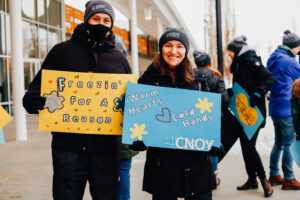
Relationships are everything in the Community Space.
While things like meals and showers might be what first brings people through the doors, they soon learn what other programs might help them along. We offer programs like housing, employment, and mental health, to name a few, which help uncover what barriers people are facing. As staff work to build relationships with people to help find their strengths, folks can start recognizing how best to address these root causes.
No two experiences with houselessness are alike. Building positive relationships can help people recognize their strengths and resiliency – ultimately helping them find their path out of poverty. And, when they’re ready to take those first steps in their journey, Bissell Centre staff help find the resources they need to live a good quality of life.

Every journey is unique – and everyone gives back differently.
Doug has been coming to the Community Space for a few years now. In his own words, it’s his home away from home. The relationships he’s built are like family to him. And like any good family, he finds ways to give back.
The main way Doug gives back to the Community Space is by volunteering in the Community Closet, helping folks find new clothes. Other times, Doug walks around the encampments nearby to see if anyone needs any help. Any way that Doug can help, he wants to offer it to the community that’s given him so much.
“If it weren’t for Bissell Centre, I think we’d all be lost,” says Doug. “They’re helping me out, so I want to help them out too.”
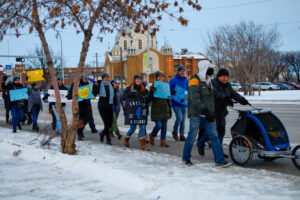
How you can help too.
This year’s Coldest Night of the Year fundraising walk sees all proceeds raised going directly back to the Community Space to support its invaluable operations and programs. Start a team, raise some money, and bring out the whole family for a walk downtown on February 24, 2024. Thank you to all our event sponsors, including our Lead Sponsor Capital Power for providing the single largest sponsorship contribution we have ever received.
Kari’s eviction notice came swiftly. She had a month to find new accommodations for her and her adult sons with special needs. Unsure how she could find a place on such short notice, Kari considered all her options, from living in a storage unit to even living in her car. Then she remembered a community organization.
“I knew about Bissell Centre—I worked with Bissell Centre while teaching a crafting course,” Kari says. Despite her prior knowledge of the organization, Kari was surprised to learn about the Community Bridge program and how it could help her secure a new home.
As part of the Community Bridge program, Kari was given a $2,000 open-ended, interest-free loan to cover her damage deposit and rent, which she paid back proudly. “I wanted to make sure that resource was there and ready for the next person who needed help.”
A Kokum’s Giving Spirit
This giving spirit is typical for Kari – whose community frequently refers to her as the Community Kokum, or grandmother, providing love, support, and guidance whenever and wherever she can. Even when her pantry was empty and her power shut off, Kari still looked after others and considered her situation manageable.
“I’ve had to flee domestic violence,” says Kari. “While in the shelters, I saw many women in similar situations and how much worse off I could have been. I never saw myself as a victim. I have a lot of resilience that’s helped me through some tough times.”
Prior to reaching out to Community Bridge, Kari faced many uphill battles – especially when it came to where she called home. Kari has moved four times in four years through low-income housing and encountered varying levels of domestic violence and abuse. She’s also struggled with her adult children’s special needs, experienced houselessness while seven months pregnant and underwent multiple medical procedures. Kari tried to push through it without any outside help, but when she needed assistance, she knew Bissell Centre would be there with solutions. However, Kari wasn’t expecting this amount of support from Bissell Centre’s Community Bridge.
“Everything with Community Bridge was no pressure and fell into place seamlessly,” Kari explains. “It took two weeks to learn I had a loan and two weeks after that, I secured my place. I took possession of my new home before I moved out of the last place.”
How Community Bridge Helped Kari
The Community Bridge program is essential to Bissell Centre’s operations. Between April 2022 and March 2023, the Community Bridge program prevented 511 individuals from housing-loss, resulting in 214 households served, with another 202 households assisted with loans. Ensuring people don’t lose their homes and experience houselessness is the team’s top priority – so the first place they look to help folks out is with their current landlords. The team negotiates on behalf of the people they’re helping to prevent any untimely evictions.
When landlords are unable to negotiate any further and eviction is imminent, Community Bridge Support Workers then work directly with the people who need a new place to live, helping make the transition to their new place as seamless as possible.
Partners Make These Programs Possible
A program like this wouldn’t be possible without our partners in the community, like ENMAX. Their support has been crucial for Community Bridge to help people find places to call home.
And as Kari points out, it’s not just finding and funding new spaces that makes this program indispensable – it’s the regular follow-ups and wraparound services that have helped keep her and her family in their new home.
“I think more people should check out Bissell Centre to know what it has to offer,” says Kari. “Without Community Bridge, I would be experiencing houselessness. I never thought I would be in that position. Bissell Centre made sure I still had a place my sons and I could call home.”
Individuals connected to our Fetal Alcohol Spectrum of Services (FASS) program contributed to a book about the challenges and realities of navigating life with Fetal Alcohol Spectrum Disorder (FASD). Under the guidance of Jared Epp, Carleton University PhD candidate and former housing support worker with Bissell Centre, who facilitated the group in sharing stories of what was most important to them. Fifteen people shared their stories, captured in this captivating collection. Born Broken is a book that’s an immersive experience into what it means to have FASD and the barriers it can create.
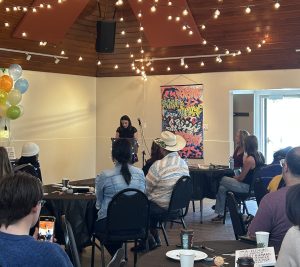
The group celebrated the release of this Born Broken book this past month with a small and intimate reading and sharing. Everyone who contributed to the book received a copy, and a few were shared around the community to help spread its positive message.
Copies of Born Broken books are available to purchase from the Bissell Thrift Shop on 118 Avenue or Paper Birch Books at 10825 95 Street.
Below is the preface to the book, written by Jared Epp. This firsthand experience of seeing the collection come together illuminated the importance of this book for the contributors and for those about to read it and gain a better understanding of FASD.

Preface from Born Broken
A group of individuals connected to Bissell Centre’s Fetal Alcohol Spectrum of Services (FASS) came together for a book project. The goal was to provide an opportunity for folks to share whatever kind of content they wanted. Leaving it open-ended allowed the individuals participating in the project to share what was meaningful to them. Their contributions didn’t have to only be about living with Fetal Alcohol Spectrum Disorder (FASD). A number of contributors did want to share their stories about living with FAD, about their daily challenges, as well as the impact of receiving their diagnosis. Others talked about different things. There are stories about adventure on Edmonton’s public transit, sewing denim, dreaming, making music and art, the challenges of finding and keeping a job and many other events and situations the reader will soon encounter.
Woven throughout the book are stories, ideas, frustrations, thoughts and reflections, offering a window into the experience of entering into the world a certain way.
In our last group meeting, we had to come up with a title for the book. Each contributor present was invited to come up with some titles, and then there would be a vote.
These were the title ideas:
- Born Broken
- The Struggle is Real
- Drumbeats of Hope
- Light in the Dark
- Perfectly Imperfect
- Getting Dealt a Bad Hand
Everyone had agreed on Heidi’s subtitle, “Reflections on Life and Resiliency from Individuals living with FASD,” as it put a positive spin on the main title.
Born Broken won by one vote over The Struggle is Real and Light in the Dark. There was a lot of discussion and debate on the chosen title. Some people felt it was too negative, but they also acknowledged it’s sentiment. In many ways, the titles and the debate around it set a theme that echoes through each story: individuals confronting and overcoming something they were born with, have no control over, and yet seems invisible to those outside the lived experience of FASD. The reader is invited to encounter the diverse contributions within the book, keeping in mind the unsettled nature of its title and the realities of living with FASD.
-Jared Epp

If Bissell Centre didn’t exist, I’d be dead—I know I’d be dead. Before they helped me, I had nothing, and now, I have everything. My name is Dave and I’m originally from BC, but moved to Yellowknife, a colder and darker city than Edmonton. Believe it.
Although I was living in Yellowknife for work, the city didn’t work for me. I was drowning there. My alcohol abuse landed me in and out of jail, and I reached a point where I said to myself, “Dave, you’ve gotta go, this city’s killing you.” So I left. I hoped moving to Edmonton would give me a new start after the hard times I’d faced up north.
When I got to Edmonton, things didn’t turn out how I planned. I didn’t know anyone in the city, and I couldn’t find a place of my own. Immediately, I ended up on the streets living rough.
I didn’t own much, but I kept my few possessions in garbage bags and carried them with me. You don’t know what it means to struggle for survival until you’ve carried everything you own in garbage bags. I got to know other characters on the Edmonton streets. It can be rough and you can’t believe or trust everyone, but I consider many of them family and friends I can trust—good people who fell on hard times.
I went to Bissell Centre pretty quickly after coming to Edmonton, and eventually it became the closest thing that I had to a home. They’ve got staff who really care about you—they became my good friends too.
Bissell Centre staff connected me with an addictions and mental health worker. They also assigned a housing worker to help find me a place. I was homeless in Edmonton for about 10 years before I was ready to look for housing. Through the Homeless to Homes program at Bissell Centre, I have a home of my own, after 10 years on the street—10 years without a place that’s warm, safe, and mine.
I had lots of friends on the street, but I wouldn’t share with anyone where I was living because I didn’t want anything to happen that might encourage old habits. I’ve worked hard to recover from alcohol addiction and I’m proud to say that I’m 18 months sober!
I’ve worked hard to recover from alcohol addiction and I’m proud to say that I’m 18 months sober!
In May of 2018, I was at home by myself and something happened to my sight. Everything looked distorted and blurry. My right side felt numb and weak. I couldn’t walk and I slumped to the floor. It was two days before a neighbour found me and called 911. I didn’t think I would make it. But thanks to my neighbour, the paramedics came and took me to the hospital where they told me that I’d had a stroke.
Somehow, Bissell Centre staff learned that I was missing and found me in the hospital. While I was in the Glenrose Hospital, they worked with my landlord to find me a new apartment—my old place was on the third floor and would’ve been impossible for me to access. The new apartment that they found for me is in a building with an elevator, so I can get into my home.
Bissell Centre’s staff have gone above and beyond for me. They do a whole bunch for me. They’re currently helping me to get into a lodge that can help me with my rehabilitation.
Before I got sober, I didn’t care. But now, I can spend my money on things that I actually enjoy, like books and DVDs. Getting housed was right on! I’ve even reconnected with my son.
I am grateful to Bissell Centre and to the people who give to them and make their work possible. They’re doing good work in our city—I wish more people knew about Bissell Centre and what they do. They got to know me and they’re still helping me where I’m at today. Without the help of the Bissell Centre, I would have died on the street. I had nothing, and now I have everything.
Donations from the community help people like Dave find a fresh start in life, feel loved and cared for, and build important connections with others. Please consider providing essential, life-changing services to people in need this Easter season.
Thanks to our incredible supporters, we were able to implement positive changes and saw huge successes that truly impacted the people we served this year! Here are some of our favourite moments of 2017.
1) Struggling Families Treated to More Summer Camp Experiences
Moonlight Bay Centre, our camp site at Lake Wabamun, has been a place of solace, rest, and rejuvenation for struggling families. Through traditional summer camp activities, kids and adults alike made meaningful connections while enjoying a respite from the stress of city life. This year, we offered six 4-day camps, enabling us to host 143 people, including 51 children.

2) Financial Empowerment Program Launched
In partnership with E4C and the Institute for the Advancement of Aboriginal Women, Bissell launched its Financial Empowerment Services. This national program strives to improve the financial well-being of people with low incomes through education, coaching, and supports. We are seeing more people filing their taxes than ever before!
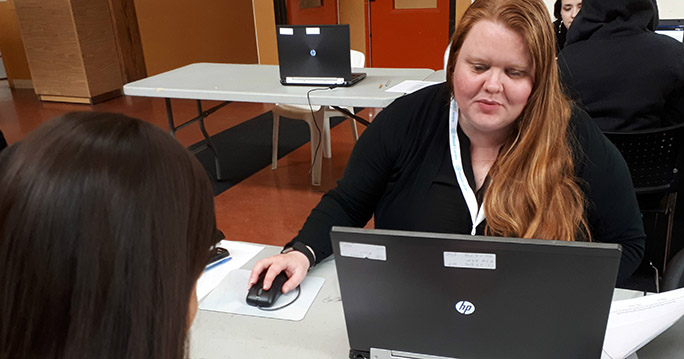
3) Bissell’s Expanded Outreach Housing Team Houses More People than Ever
Our Outreach Housing team alone helped 55 people, including 19 children, find permanent homes in October. This was a record number of people supported in a single month! To date, with the assistance of our housing services teams, approximately 345 people have been housed this year, and 318 adults, parents, and children avoided eviction with support from our Community Bridge team.

4) Neighbours Come Together to Commemorate National Indigenous Peoples Day
National Indigenous Peoples Day is held across Canada every year to celebrate and recognize the unique cultural heritage of First Nations, Inuit, and Metis Peoples. Many of our friends and neighbours gathered at Bissell to enjoy singing, dancing, drumming from various indigenous backgrounds, along with stew and bannock meals, traditional arts activities, and more!

5) Renovations Commence to Improve Access to Supports
Bissell Centre has operated drop-in services for over a hundred years as a means of engaging with individuals who struggle with homelessness and poverty. We received funding to renovate our communal space in order to improve our clients’ ability to access the services they need to meet basic needs, obtain critical supports, develop skills, and build relationships. We’re excited to implement our service model and take another step toward eliminating poverty in our community.
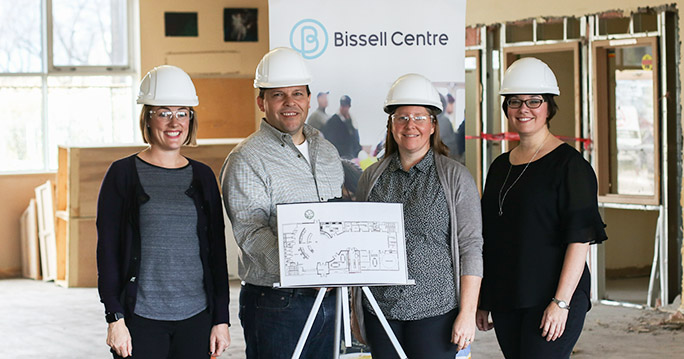
6) Bissell Introduces FASD Medic Alert Bracelets
In October, our Fetal Alcohol Spectrum of Services team launched MedicAlert’s pilot FASD bracelet program at Bissell. The program aims to achieve more equitable treatment for persons living with a Fetal Alcohol Spectrum Disorder by raising awareness among emergency first responders on how to approach these individuals as identified through their MedicAlert ID.
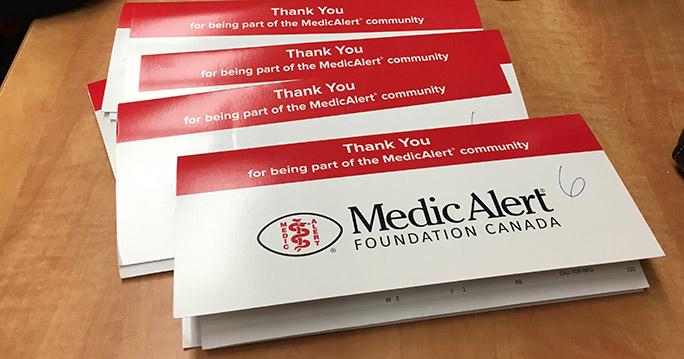
7) Bissell Donors and Volunteers Bring Joy to People in Need During the Festive Season
Five hundred and ninety three Bissell Elf volunteers helped make this Christmas season especially warm and friendly! Two hundred and fifty heaping plates of turkey, vegetables, stuffing, and salad were served at our Christmas meal, 143 families received gifts through our Festive Giveaway event, and 228 people helped wrap gifts to raise funds for Bissell’s programs and services during our Gift Wrap for Bissell events. Thank you to each and every person who helped bring comfort and joy to the people who lean on Bissell Centre for support over the holidays!
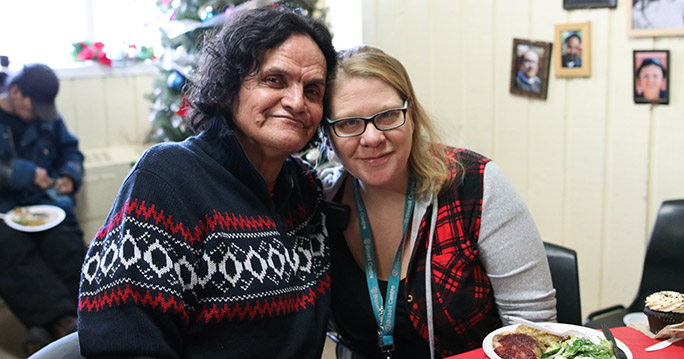
As we look back on 2017, we are reminded that the work that we do at Bissell Centre would never be possible without your support.
THANK YOU, from the bottom of our hearts!
Help create more memories like these by joining our family of supporters today. Make a donation.
When people come to Bissell Centre for the first time, it is often to meet the most basic of needs: a hot meal away from the cold.
That’s how it began for James.
Twenty years ago, James ate his first meal at Bissell Centre when he had nowhere else to go. At the time James was homeless and engaging in a criminal lifestyle to get by.
He had been surrounded by substance abuse and violence since he was a child. As a young man his criminal record and addictions kept him on the streets.
“When you’re a user, nobody wants you around,” he said. “It was tough to get a place.” When he did ask for help, James was used to getting pushed away.
That first experience at Bissell Centre was different. James noticed how welcoming the staff and volunteers seemed, how eager they were to help.
“They were everywhere for me. If I need help, it’s there.”
To the people who knew him at the time of his first meal at Bissell Centre twenty years ago, James is unrecognizable today. In the past few years, he has undergone an incredible transformation. It has been a long journey to health and recovery, but a worthwhile one.
After hitting a low point in 2012, when he suddenly faced a seven-year prison sentence on drug charges and feared he was throwing his life away, James got serious about getting clean. He served four of the seven years, has been sober for five years, and has been accessing Bissell’s support programs including counselling, employment, and housing services.
After years of hard work and healing, James moved into an apartment: his first permanent home in two decades.
James spends a lot of his time helping others find sobriety and health like he did. You can usually find him outside Bissell Centre chatting with the patrons. “I [tell them] what I’ve been through with the drugs, what it cost me, my time and my life,” he explained. “I try to encourage them to come my way. If they need help, I tell them where to get help.”
Because of support from our community, we will be serving over 600 turkey meals for people in need this Thanksgiving. Many of them may be walking through our doors for the first time. And for some like James, it may mean the beginning of lasting life changes for the better. Holiday meals at Bissell Centre are never just food and drink. They are community, healing, and togetherness.
This Thanksgiving, we’re thankful for our community of supporters, for the hope they inspire, and for the healing they make possible.
Give today to help more people like James this Thanksgiving!
“We need to be careful about using anecdotal evidence to dismiss the validity of the homeless count,” says Gary St. Amand, CEO of Bissell Centre.
The most recent survey and data analysis estimate that the number of people who are homeless in our city has decreased from 2,307 people in 2014 to 1,752 people currently.
“The homeless count is meant only to be one snapshot of homelessness and while we need to be reflective about its methodology, it is also important that we consider all the evidence before jumping to sweeping conclusions about its accuracy,” explains St. Amand.
For example, Bissell Centre has supported over 1,500 individuals and families since the last homeless count in 2014 through its housing and eviction prevention work. The organization has assisted 545 people to find housing and 1,009 people to avoid imminent evictions.
“Further to that, while we have experienced a rise in the usage of our services since the last homeless count, our data has shown that this was the result of new services that we implemented during that period,” explains St. Amand. “These new services connected us with people who are new to Bissell Centre and they capture the majority of the increased service use throughout our organization.”
Another consideration is the forced relocation of homeless people due to the recent significant development of Edmonton’s downtown core. When coupled with the seasonal increase of people sleeping outdoors in the summer months, a rise in the number of homeless people in various locations around the city, including the river valley, is to be expected.
This raises the question of whether the rise in numbers in certain locations is due to the movement of homeless people rather than a net increase of the homeless population in Edmonton, as some have argued.
“To call into doubt the methodology of the homeless count without a thorough and thoughtful review of the evidence diminishes the good work that is happening by many organizations and individuals in the community,” says St. Amand.
“We need to maintain our focus on housing, because whatever your view of the housing count is, we still have over 1,700 people living on the streets and that should be unacceptable to all of us. We need to continue to work together as a community to bring long-term solutions to this issue,” says St. Amand.
Related links
We’re proud to announce that our Outreach Housing Team has met its ambitious goal of housing 200 people–and they did it 3 months ahead of schedule!
In early 2015, students from Strathcona High School raised $190,000 for Bissell Centre as part of their Treehouse Project fundraiser. These funds went towards establishing our Outreach Housing Team (OHT), a new program dedicated to locating, engaging, and housing people who are homeless. Since then, the OHT has successfully housed 200 people, a figure that continues to climb with each passing week.
One of the people helped by our Outreach Housing Team is “Steven,” who up until last year was homeless and sleeping in the River Valley. Steven’s social anxiety stopped him from accessing the help he needed. “At the time I was very bad with communicating with people,” he says. “I didn’t like phone calls.” But Steven knew he needed to make a change, and decided to contact Bissell Centre. He was quickly put in touch with our Outreach Housing Team, who found him a house in August 2015.
Since then, Steven has returned to school and is working on a marketing degree. He has plans to start his own business after graduation. Even though he was at first afraid to ask for help, he encourages anyone who is in the same position to reach out to someone. “You have to do it,” he says. “Life is damn scary. But you have to walk into the dark a bit sometimes to find the light.”
“Life is damn scary. But you have to walk into the dark a bit sometimes to find the light.”
– Steven, Housing Participant
Because there are few strict criteria that a candidate must meet to be eligible to access OHT services, people who do not qualify for similar housing initiatives can almost always get help through OHT. The team’s focus on keeping the paperwork to a minimum has made the housing process simple and streamlined, allowing them to house more people with fewer resources than other housing programs.
“It’s amazing how much you guys help,” says Steven. “Anyone who needs help – phone the Outreach Housing Team. They’re the ones that care, and they’ll do what it takes to get you off the streets. There are organizations who get thirty or forty million dollars in funding a year who don’t do as much.”
We are proud of the work the OHT has done over the past several months. But now, as funds dwindle and resources become scarcer, the support of the community has never been more important. It began with a group of extraordinary high school students and has resulted in 200 people like Steven finding homes and new hope for the future. Our hope is that the OHT will continue to grow and evolve with the help of our caring, dedicated community.
Thank you for your support!
MAKE A DONATION TODAY

In addition to being the humane thing to do, a major 5 year study funded by the Federal Government has demonstrated the cost effectiveness of housing the homeless. As reported by CBC’s As it Happens, “The report suggests putting homeless people in housing, even before they have dealt with other problems such as mental illness and addiction, works to improve their lives. And it saves money.” The study focused on the Housing First approach to housing the homeless, which is the approach Bissell Centre uses in its Homeless to Homes program. For more info about our local Housing First teams go to the Homeward Trust site HERE.
Louise Bradley, President and CEO of the Mental Health Commission of Canada, was interviewed about the study by CBC’s Louise Bradley. You can listen to it by clicking the listen button below.

Resources of Interest
A Place to Call Home: Edmonton’s 10 Year Plan to End Homelessness(PDF Format) – Prepared by the Edmonton Committee to End Homelessness
A Plan for Alberta: Ending Homelessness in 10 Years(PDF Format) – Report from the Government of Alberta’s Alberta Secretariat for Action on Homelessness
Stories from people who live without housing, published 2008 – Bissell Centre report

” On the streets, a shopping cart is called a “buggy.” When I was homeless, I avoided “pushing a buggy” as long as I could. When that day finally came – when I had to get something from point A to Point B and had no other option but to use a shopping cart – I could no longer be in denial about my situation. I was homeless. As you can imagine, accepting that reality was devastating. That day was really a low point of my life. Maybe one of the lowest. I wish I could put into words how crushing it was to my sense of worth. Accepting that I was homeless meant that I had to also accept I may never get out of homelessness. But I was one of the lucky ones.”
Taken from “Invisible People,” a blog by the homeless about being homeless. Click here to read more.
The photograph above made me think. How often I am annoyed when I have a grocery cart with a wobbly wheel or that puts out an irritating squeak while I fill it up with food and supplies. The photograph reminded me of how crazy that is — to be so blessed that I can fill a grocery cart but instead of being grateful I am whining about a very small inconvenience.
A short while ago I wrote a blog posting here called “Move the Homeless Along?” in which I shared with you the pressures we are facing at Bissell Centre to actively discourage homeless people from congregating around our facilities. As mentioned in that narrative, I shared that there are voices telling me that it is better to scatter the homeless around the city than have them grouped together. I also shared my view that the rising pressure we are facing to move the homeless along is motivated by a desire for a better, cleaner, less upsetting aesthetic. Simply put, homelessness is ugly and upsetting and people don’t like to look at it or put up with its many side effects like drunkenness, human waste, needles scattered across lawns and in back alleys, and the eyesore of unkempt people.
I am troubled by all of that, too. We have staff make rounds several times a day picking up needles, cleaning up waste, and trying to stop open drug and alcohol use. We also had a crew going around the neighborhood recently cleaning up debris and litter as well as the paraphernalia of homelessness. I have no delusions about making a huge improvement doing that, but it’s better than doing nothing.

Now we are facing pressure to participate in actions that will take away grocery carts from the homeless. Yes, I know those carts were stolen from grocery and department stores and I know it is a crime to steal such carts. If the theft of grocery carts is a high priority for the police, I will understand if they take actions to reclaim them; the police have a mandate to stop crimes and arrest people breaking the law. Arresting people for grocery cart theft won’t end the use of carts by homeless people, however.
Grocery carts or “buggies” represent the last efforts of homeless people to have the ability to keep what little belongings they have: their blankets and tarps,extra clothing, bottles and cans, and so on. People pushing buggies and carts are doing so because, without them, they have nothing. Our mandate is to help the homeless. We help them by housing them, linking them to needed health services, assisting them with addictions issues, and we also feed and clothe them. There are very few organizations that welcome the homeless into their facilities daily and actively care about them and for them.
That’s why our drop-in centre is staying open this winter seven days per week from 6 a.m. until 9 p.m. and why we have outreach staff on the streets 24 hours per day, 365 days per year. We are able to do this with the support of organizations like Homeward Trust and REACH Edmonton, among other funders, but also because of individual donations from citizens across the city who actually want us to do as much as we can to help the homeless and the poor with housing, support, and the wide variety of interventions we are able to provide.
Ending homelessness will not be served by scattering the homeless across the city. It will not be served by stripping the homeless of their carts; in fact, doing so will do nothing but harm the general community’s interest in stopping homelessness from occurring in the first place. It may improve aesthetics and it may give some of us the impression that homelessness is not such a huge problem, but the truth is that if we want a community free of people pushing grocery carts, we need to end the homelessness of those currently experiencing it while preventing others from ending up on the street.
If anything, feel free to pressure Bissell Centre to do more of that work to end poverty and homelessness. Share that pressure with our provincial and civic leaders, the lead staff of funders and faith groups, and our corporate leaders as well. Yes, all of those mentioned are trying to end poverty and homelessness, but we have a long ways to go. We feel that pressure every day at Bissell Centre when we have to tell a homeless person there is no place we can find for them – and we are pretty good at finding accommodations as are other organizations focused on finding homes for the homeless.
There are a number of definitions for the word, “crime.” One of them is about doing something against the law and stealing a grocery cart fits that definition. In this instance, the homeless would be seen criminals and could be arrested. But there are other definitions of crime such as “a grave offense especially against morality” and “something reprehensible, foolish, or disgraceful” (Merriam Webster). In this case I suggest that homelessness is the crime. That said, I am not sure who should be arrested for that.
Bissell Centre will continue to work hard to eliminate the need for carts by participating in the collective efforts of those committed to ending homelessness.
If you are interested and able to help us with our work to do more, please consider investing in Bissell Centre by donating to our mandate to eliminate poverty and end homelessness.
Mark Holmgren, CEO

















